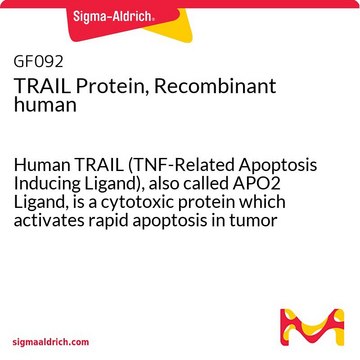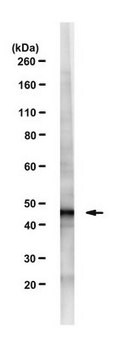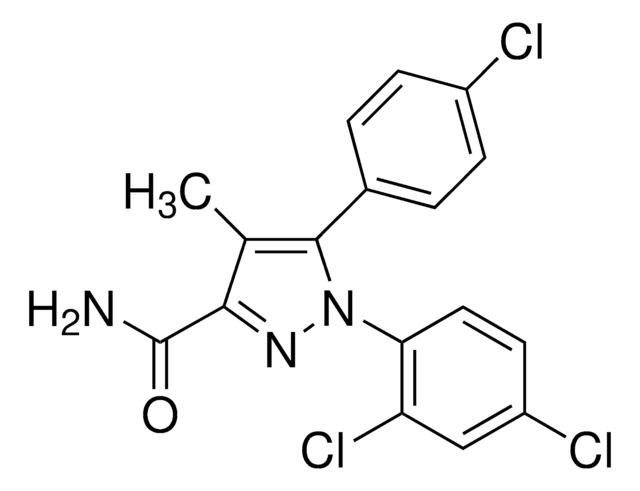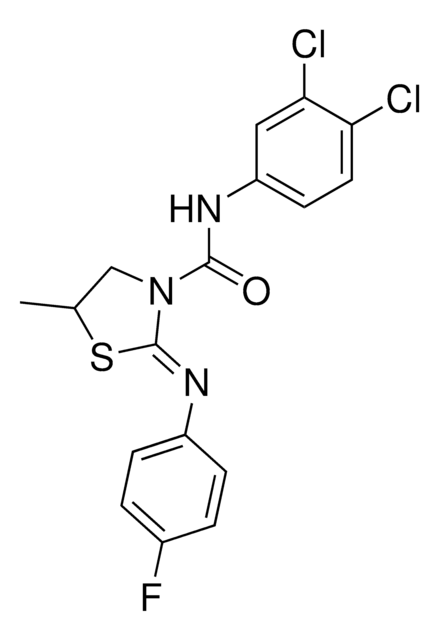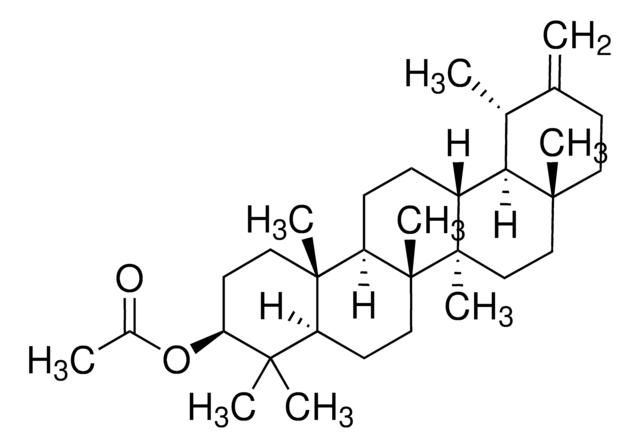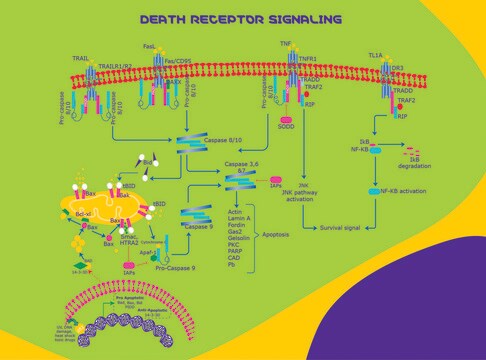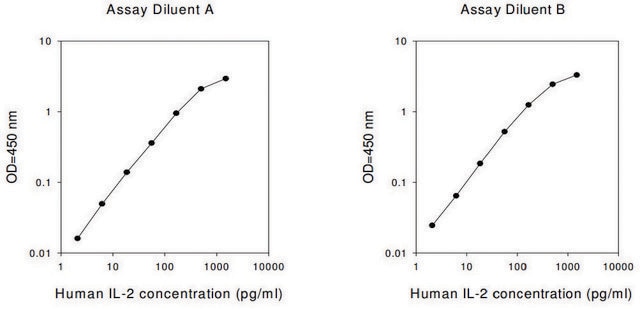616376
TRAIL, Human, Recombinant, NSO cells
Synonim(y):
Apo2L; TNF-Related Apoptosis-Inducing Ligand
Zaloguj sięWyświetlanie cen organizacyjnych i kontraktowych
About This Item
Kod UNSPSC:
12352202
NACRES:
NA.77
Polecane produkty
rekombinowane
expressed in NSO cells
Poziom jakości
Próba
≥97% (SDS-PAGE)
Postać
lyophilized
producent / nazwa handlowa
Calbiochem®
warunki przechowywania
OK to freeze
zanieczyszczenia
≤1 EU/μg Endotoxin (EU/μg TRAIL)
Warunki transportu
ambient
temp. przechowywania
−70°C
Opis ogólny
Recombinant, human TRAIL (amino acids 95-281) with an amino-terminal 6X histidine tag and expressed in NSO cells. A type II transmembrane protein with a C-terminal extracellular domain that exhibits homology to other members of this tumor necrosis factor (TNF) family. Displays potent anti-tumor activity against selected targets. Induces apoptosis in a number of transformed cell lines but not in normal tissues. Recombinant bioactive TRAIL is a non-disulfide-linked homotrimer but may contain a small amount (up to 10%) of disulfide-linked homodimers.
Recombinant, human TRAIL expressed in NSO cells a type II transmembrane protein with a C-terminal extracellular domain, which exhibits homology to other TNF family members. Displays potent antitumor activity against selected targets. Induces apoptosis in a number of transformed cell lines but not in normal tissues.
Działania biochem./fizjol.
ED₅₀ = 4-12 ng/ml as measured by its ability to induce cytotoxicity in mouse L-929 cell line in the presence of metabolic inhibitors actinomycin D
Ostrzeżenie
Toxicity: Standard Handling (A)
Postać fizyczna
Lyophilized from sterile-filtered PBS, 50 µg BSA/µg TRAIL, pH 7.4.
Rekonstytucja
Following reconstitution, refrigerate (4°C) for short-term storage or aliquot and freeze (-20°C or -70°C) for long-term storage. Stock solutions are stable for up to 1 month at 4°C or up to 3 months at -20°C or -70°C. Avoid freeze/thaw cycles of solutions.
Reconstitute to ≥20 µg/ml in sterile PBS, 0.1% BSA.
Inne uwagi
Griffith, T.S., et al. 1999. J. Exp. Med.189, 1343.
Mariani, S.M., et al. 1997. J. Cell Biol.137, 221.
Pan, G., et al. 1997. Science277, 815.
Pan, G., et al. 1997. Science276, 111.
Sheridan, J.P., et al. 1997. Science277, 818.
Pitti, R.M., et al. 1996. J. Biol. Chem.271, 12687.
Mariani, S.M., et al. 1997. J. Cell Biol.137, 221.
Pan, G., et al. 1997. Science277, 815.
Pan, G., et al. 1997. Science276, 111.
Sheridan, J.P., et al. 1997. Science277, 818.
Pitti, R.M., et al. 1996. J. Biol. Chem.271, 12687.
Informacje prawne
CALBIOCHEM is a registered trademark of Merck KGaA, Darmstadt, Germany
Ta strona może zawierać tekst przetłumaczony maszynowo.
Kod klasy składowania
11 - Combustible Solids
Klasa zagrożenia wodnego (WGK)
WGK 1
Temperatura zapłonu (°F)
Not applicable
Temperatura zapłonu (°C)
Not applicable
Certyfikaty analizy (CoA)
Poszukaj Certyfikaty analizy (CoA), wpisując numer partii/serii produktów. Numery serii i partii można znaleźć na etykiecie produktu po słowach „seria” lub „partia”.
Masz już ten produkt?
Dokumenty związane z niedawno zakupionymi produktami zostały zamieszczone w Bibliotece dokumentów.
Nasz zespół naukowców ma doświadczenie we wszystkich obszarach badań, w tym w naukach przyrodniczych, materiałoznawstwie, syntezie chemicznej, chromatografii, analityce i wielu innych dziedzinach.
Skontaktuj się z zespołem ds. pomocy technicznej

